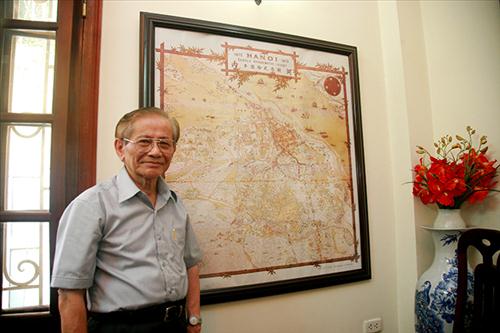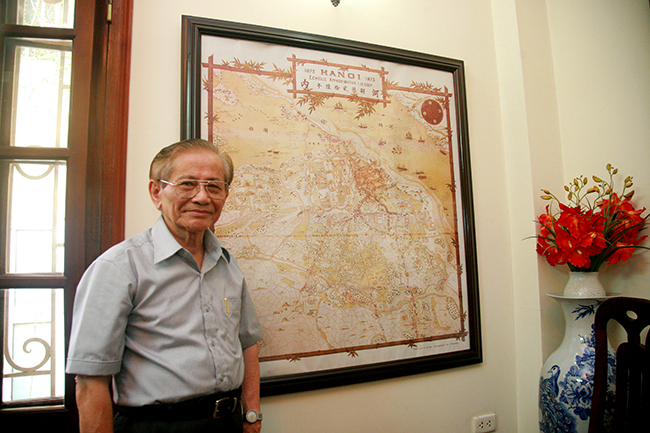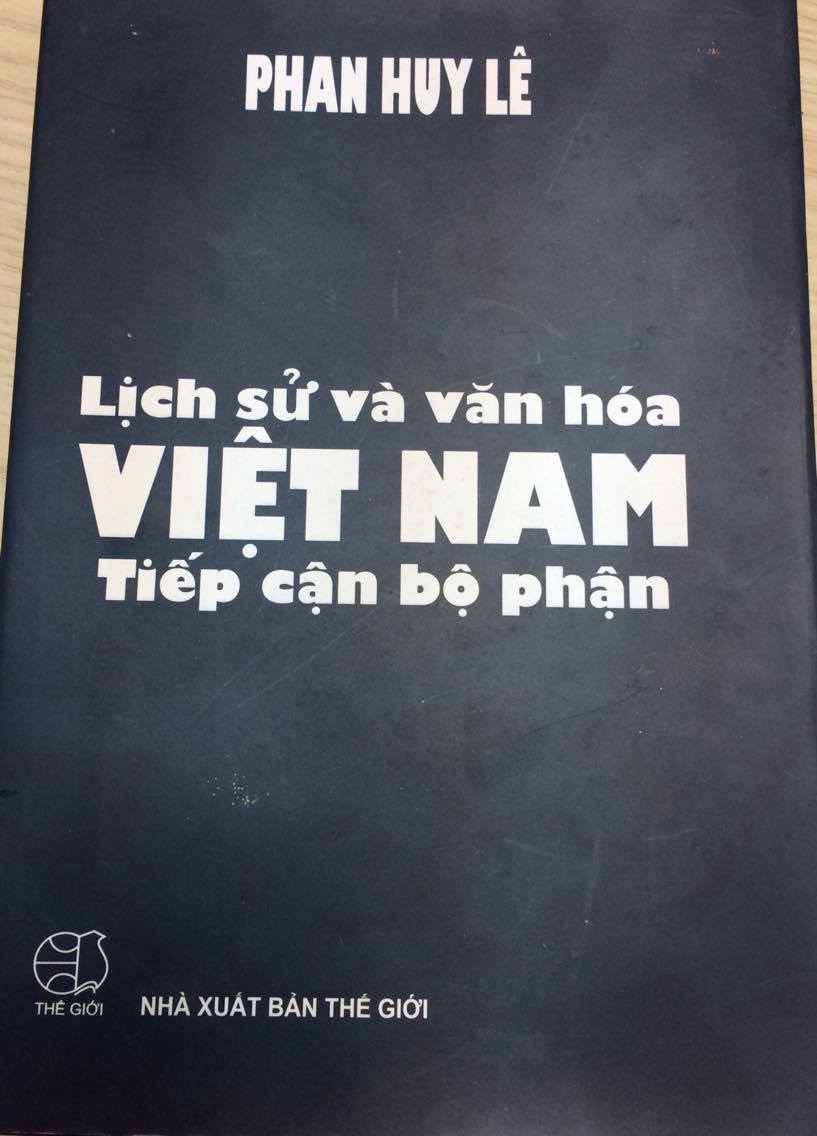
The project was proposed by the State Council to be awarded the Ho Chi Minh Prize for Science and Technology, Phase V, 2016. The VNU electronic information portal respectfully introduces to readers some features of this project.
THEORETICAL FOUNDATION FOR THE "FLOW" OF VIETNAMESE HISTORY
.jpg) According to Professor Phan Huy Le, the most important point in historical research is historical sources. Based on the limitations in previous historical research and perception, the author presents his views on the multi-linear, complete and comprehensive nature of Vietnamese history.
According to Professor Phan Huy Le, the most important point in historical research is historical sources. Based on the limitations in previous historical research and perception, the author presents his views on the multi-linear, complete and comprehensive nature of Vietnamese history.
The history of Vietnam in the past was mainly presented according to the development process of the Vietnamese people and the process of moving to the South, wherever the Vietnamese people went, history originated from there. Thereby, the history of the South Central region only began from the 16th century, the history of the South only began from the 17th century.
Based on new research results, the author establishes the view that Vietnamese history is the history of all communities and ethnic groups that have lived in the present-day Vietnamese territory. Because according to the author's point of view, besides the mainstream of cultural history of the majority of the Vietnamese people, it also includes the integration streams of other ethnic groups.
With that overall perspective, the author sketches the ancient history of Vietnam including the Dong Son cultural center and the Van Lang - Au Lac state in the North, the Sa Huynh cultural center with the Lam Ap - Champa state in the Central region and the Oc Eo cultural center with the Phu Nam state in the South. From this sketch, the book Vietnamese History Volume I (Hanoi Education Publishing House, 2012) was officially included in the Vietnamese history curriculum of the Faculty of History (University of Social Sciences and Humanities), Hanoi National University, taught by the author himself.
In addition, the work analyzed the changes in the period that can be said to be a "turning point" in Vietnamese history in the first half of the 10th century, that is, starting when Khuc Thua Du declared independence in 905, the consolidation of the government under Khuc Hao until Duong Dinh Nghe and the resistance war against Nam Han in 930 - 931; Ngo Quyen with the Bach Dang victory in 938. The time when the period of Northern domination ended to open the first independent feudal period in Vietnam.
The author also delves into the interpretation of the changes in the historical period from the end of the 14th century to the end of the 15th century, from the end of the Tran Dynasty to the Ho Dynasty, through the resistance war against the Ming Dynasty to the Lam Son uprising through the early Le Dynasty in all aspects from: economy, society, to politics, ideology and culture. The author believes that the above period is not only a crisis of changing the dynasty but also profound changes, associated with changes in the economic structure, society, ideology and development model of the centralized monarchy in Vietnam.
Regarding the summary of Tay Son history, the author analyzed the contributions and limitations, the reasons for the victory and failure of the Tay Son movement at the end of the 18th century.
Assessing the significance of the work, Prof. Dr. Vu Minh Giang - Chairman of the VNU Training Science Council affirmed that for the first time in the history of Vietnamese culture and history research, the multi-linear, comprehensive and holistic viewpoint was presented systematically in a general form as a principle and explained along the historical process of ancient and medieval Vietnam, as a theoretical foundation for a massive, large-scale work that was connected in a continuous way. This is a big step forward on the path of understanding national history and culture, which is understood as a layered but relatively unilinear development process. This opens a new stage for the development of Vietnamese historiography when starting to apply the implementation of the Project on Research and Compilation of Vietnamese History edited by Prof. Phan Huy Le himself.
“Although the work is in the field of social sciences and humanities, the interdisciplinary nature is very high in many studies, the presence and contributions of many other scientific fields, exploited by scientists outside the field of social sciences and humanities. In particular, the content of the work has been used as a scientific argument to build a dossier to submit to UNESCO to propose recognizing Thang Long Imperial Citadel as a World Cultural Heritage”, emphasized Prof. Dr. Vu Minh Giang.
SCIENTIFIC BASIS FOR DETERMINING THE LOCATION OF THANG LONG IMPERIAL Citadel
In the field of research on Vietnamese studies and Oriental studies, the author has established the position and development direction for these fields considered new (the author is the first person to build and establish the Faculty of Oriental Studies, University of Social Sciences and Humanities, Vietnam National University, Hanoi) as well as research the cultural relationship between Vietnam and Southeast Asian countries, East Asian countries, France, and the West to determine the cultural values of Vietnam in the cultural exchange relationship between Vietnamese people and foreign cultures.

Professor Phan Huy Le next to an old map of Hanoi
Regarding rural and urban issues, the author focuses on analyzing the situation of village research in Vietnam in the 20th century; comparing the military land system in Vietnam with China; researching the ancient land registers of Hanoi in the 19th century; the history of some ancient localities and cities such as Ha Tinh, Hoi An, Hanoi. In particular, the work deeply researches the history of Hanoi and the structure of Thang Long - Hanoi citadel from the 11th to the 19th century. This is a decisive point, a scientific basis for determining the location of the Thang Long Imperial Citadel relic site located in the central area of Thang Long Forbidden City from the Ly to Le dynasties.
 Prof. Dr. Pham Hong Tung - Director of the Institute of Vietnamese Studies and Development Sciences, VNU, commented that the work has high stature and academic value, and has a profound influence in the scientific community researching Vietnam. The unique scientific value of the work lies first of all in its high theoretical nature, academic viewpoint and approach that the author has consistently applied throughout his research. The viewpoint considers the history of the Vietnamese nation and people as a whole with the main subject being the community of Vietnamese ethnic groups. Therefore, it must be the history of all the communities of people who have ever lived on the territory of Vietnam today.
Prof. Dr. Pham Hong Tung - Director of the Institute of Vietnamese Studies and Development Sciences, VNU, commented that the work has high stature and academic value, and has a profound influence in the scientific community researching Vietnam. The unique scientific value of the work lies first of all in its high theoretical nature, academic viewpoint and approach that the author has consistently applied throughout his research. The viewpoint considers the history of the Vietnamese nation and people as a whole with the main subject being the community of Vietnamese ethnic groups. Therefore, it must be the history of all the communities of people who have ever lived on the territory of Vietnam today.
According to Prof. Dr. Pham Hong Tung, the outstanding value of the work is mainly confirmed by many new scientific discoveries with profound and new interpretations of Vietnamese history and culture through the author's in-depth research on the centers of civilization and ancient states in the territory of Vietnam, on the processes, events and historical and cultural figures of Vietnam; on typical ancient cities; on the life of rural residents; on inter-regional, inter-regional and international relations of the Vietnamese nation. This has contributed to making the awareness of Vietnamese national history more comprehensive, accurate and profound. At the same time, this is also an important guide to forming new research directions on national history and culture.
In addition, the work also has important political significance and great practical value. In research, the emergence of different views and opinions is a completely normal phenomenon. However, in recent years, both at home and abroad, research in the name of science has appeared to serve bad ideas that deny the unity of the Vietnamese people. In that context, the work has provided solid scientific arguments for the struggle to protect national sovereignty as well as the core values of the Vietnamese people.
>>> Related news on VNU website:
-Professor Phan Huy Le, a leading expert on Vietnamese history
-Professor Phan Huy Le: the bridge builder of academic and cultural exchange
-To make Vietnam become the world's "Vietnam Studies" research center
Author:Ngu Hiep - Bao Chi / Photo: Bui Tuan - VNU Media
Newer news
Older news